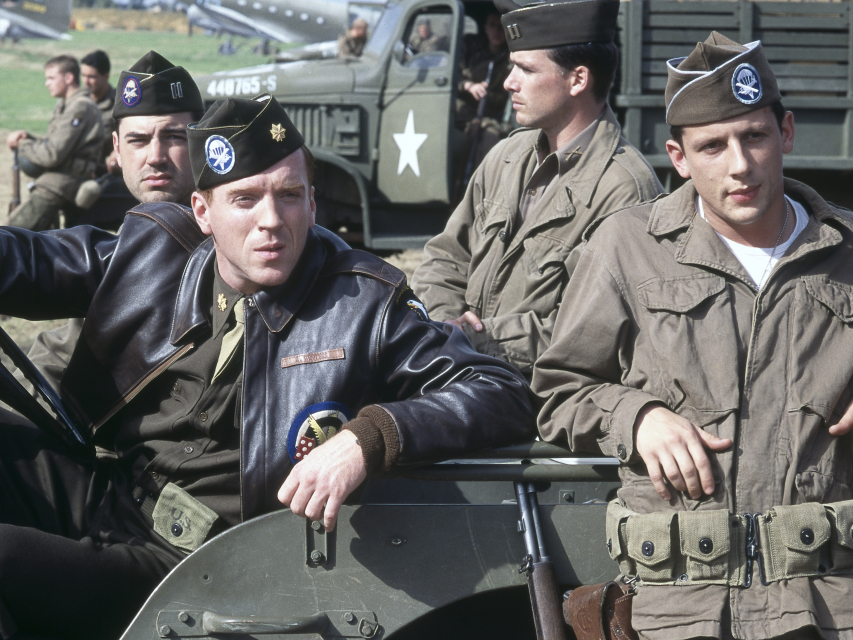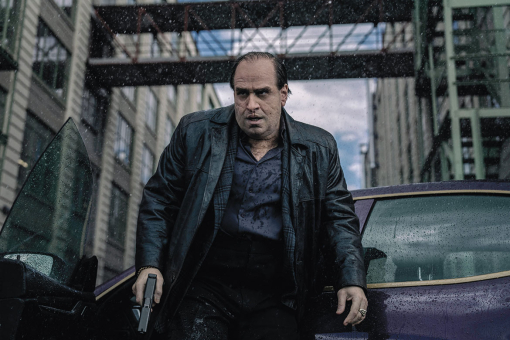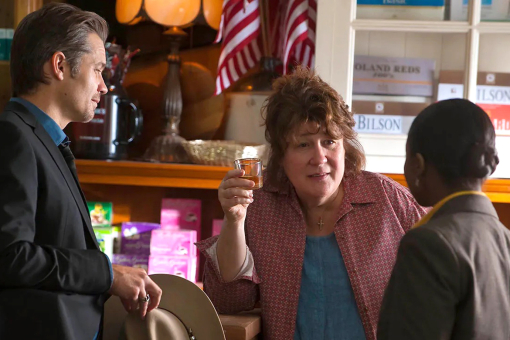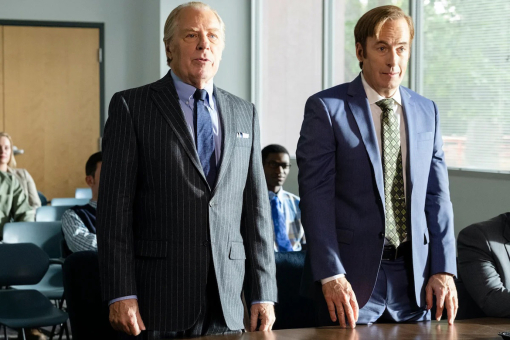The road to Band of Brothers started on the set of The Green Mile.
That’s where, in 1999, Band of Brothers’ lead writer and supervising producer Erik Jendresen first met with his soon-to-be-creative partner, Tom Hanks, to discuss adapting Stephen E. Ambrose’s 1992 book into one of HBO’s most prestigious (and enduring) miniseries. Fresh off the recent success of Saving Private Ryan, Hanks and director Steven Spielberg (serving here as executive producer) teamed up with Jendresen to tell the harrowing real-life story of the soldiers of Easy Company, 2nd Battalion, 506th Parachute Infantry Regiment of the 101st Airborne Division, and the formative struggles they faced on the frontlines of World War II.
From Easy’s early days in jump training — under the exacting thumb of the strict Lt. Sobel (David Schwimmer) — to discovering an abandoned Nazi concentration camp, Band of Brothers chronicles the well-documented exploits of this brave squad with exacting detail, thanks in large part to both Jendresen’s exhaustive research and with the help and letters from the real-life Captain Richard “Dick” Winters (played on the show by Damian Lewis in his breakout role).

Damian Lewis as Captain Winters
“There was nothing I didn’t run by Winters,” Jendresen tells the Television Academy in an exclusive interview. “All of us working on this [show] had a dedication to getting it to what we called ‘fact positive.’”
Jendresen would become close friends with Winters, whom he never called “Dick”; they always referred to each other by their last names. The two were so close that Winters’s widow, Ethel, invited the writer to deliver the eulogy at her husband’s funeral.
Winters’ legacy — and that of the show based on a significant chapter of his life — continues to resonate with both general audiences and veterans more than twenty years since the Emmy-winning series originally aired. That’s a testament to Jendresen’s approach to the material; the show doesn’t glorify war, but it does celebrate those who fight so that others don’t have to. It’s a drama about the sacrifices a select few made in an effort to protect millions. The fate of future generations rested on the shoulders of the Greatest Generation, as strangers brought together in the crucible of combat forged bonds greater than friendship and beyond family.
“Nothing was made up. It was all about what we didn’t have room for. What these men did really happened,” Jendresen emphasizes.
In honor of Veteran’s Day, Jendresen (in the first of a two-part interview) takes us behind the scenes of how he helped bring Easy Company’s story to the screen.
Television Academy: What was the development process like on this — did Tom Hanks approach you?
Erik Jendresen: I'll tell you exactly what happened. I was in Philadelphia, in the midst of a production. And I got this call from my agent, asking me if I'd read Ambrose's book. And I hadn't. He explained to me that [Hanks’s production company] Playtone and HBO wanted to do this as a series. They were looking for a lead writer; we didn't really use the term showrunner back then. And they were looking for somebody to figure out how to make it into a series, and to write a bible.
So, he sent me the book and I read it in an evening. Then, I called my agent up and said “Yeah, I’d like to talk to [Hanks] about it.” The next thing that happened is Diana Choi, who worked for Playtone, flew out to Philadelphia. I met her at the train station, and we just started to talk. And she missed her return train.
Wow. Clearly the conversation was worth it.
We just kept talking. And then, I said, “Give me a little time to think about it, to come up with an approach, and I'll let you know.” And that’s what I did; I broke it down to thirteen episodes, originally. I then went out to Los Angeles, where I met Tom for the first time on the set of The Green Mile, actually, in his trailer. We sat down. The first time meeting him, he actually walked off the set and walked up to me, and he said: “As I live and breathe, Erik Jendresen!” Which is typical Hanks.
So we sat down in his trailer, and I told him what I was thinking. He and I had independently broken it down in exactly the same way. As we were talking about it, he then said something like: “You know, I'd like you to meet with Steven. So I met with Spielberg, the two of us talked and I went back to where I was staying and got a call from my agent about an hour later that they wanted me to do this. The next step was for me to go to Hershey, Pennsylvania. Well, no, actually, that's not true.
First step was to meet with Carwood Lipton [portrayed in the series by Donnie Wahlberg], who lived not too far from where I was living at the time. He was the first member of Easy Company that I met with. And we spent a wonderful afternoon together. After that, I called Winters, which was the beginning of, really, one of the most extraordinary relationships. It would turn into a profound friendship between the two of us. For years, until his death. But it was interesting because I remember that day in Hershey, when I first met him. When I got back on the plane the next day, and I was flying out of, I guess it was Philadelphia, and looking down at Pennsylvania. I just had this flash of, one day, he's not going to be here anymore. And I don't know what that's going to be like. It was really, really strange.
Can you recall what Winters’s reaction was to your take on the book, and his contribution to the show?
The publication of Ambrose's book had really caused more reflection for the guys. And they had started remembering a lot more stuff. After the book came out, they would send things to Winters, who was still really the company commander of Easy Company, as far as they were all concerned. He was sort of the nexus for all of that correspondence and information. He had also, years before, prepared three sets of four-inch-wide binders. There were five binders in each set: U.S., England, France, Holland and Germany. They were his reminiscences in scrapbooks. He made three sets of these — one for the family, one for Ambrose and one extra because, as he put it, he knew that, one day, essentially, somebody like me would come walking through the door.
So he gave me that set, and then a ton of correspondence, so that when I came back to Charlotte to work on the [series] bible, I had stacks of boxes full of reports, letters, diaries and photographs. If I stack them up, it was about six feet tall. It was a lot of material. And I proceeded then to write the bible and do enough research until I felt as though the actions of Easy Company on any given day were lived in me, like a memory of my own. I worked very closely with Winters in the course of crafting the bible. I mean, every day, we'd be on the phone. I'd write-up something. I'd read it to him, fact check it with him, because it was all about being “fact-positive,” as far as he was concerned. From the outset, Tom and I — we had this embarrassment of riches. So we thought, “Let’s set the bar at an unreasonably high level of accuracy, and not compromise, and not necessarily be beholden to the strictures of traditional television writing or drama.” Let's let the truth lead the way.
How long was your initial series bible?
I think with an appendix, it was about 235 pages. And originally, it was broken down into thirteen episodes, which would eventually become ten.
From there, what was the process in terms of setting up the writers’ room?
Well, my job was going to be lead writer and supervising producer. So, it's essentially the role of a showrunner —
Without the actual job title.
Right. And without the day-to-day of having to be on set. My responsibility was to run the teleplays, to make sure that it was all done properly and well-written, and to really figure out how to write the thing. And I was able to. Because of time, there was no way that I was going to be able to write all ten episodes. So, we were going to bring on these other writers.
I chose episodes one, five and ten to script myself while I was supervising the writing of all the other ones, which were happening simultaneously and were written by John Orloff, E. Max Frye, Bruce McKenna, Graham Yost, Erik Bork and Tom himself.
What was HBO’s oversight on the process? How did you pull it off?
Here's how we did it: Chris Albrecht, who was running HBO at the time, he had this idea that if you put together the right creative team and then left them alone, they would produce better work than anything that they, the execs, could influence. I’m paraphrasing, but his position was: “There's no executive at HBO who can tell you people how to do this, or how to do it better. It's just not going to happen.” Which is something that would be hard to see happening today.
I bet that made the notes process relatively smooth.
We did not get one single note from HBO. Not one. All of the notes that were generated were amongst us, like Tom coming back with something, or Steven. It was all about, within this team, figuring out the show and [with] no interference from HBO. Albrecht was a genius. Not only did he have that attitude, but he was also willing to write the check and essentially give us carte blanche. And at that time, it was the most expensive show in television history.
Can you talk about how much the story changed from what you wrote for the first episode to what ultimately ended up on screen? What were some of the challenges you and your partners faced in the execution?
Tom and I faced this notion of, we have this ensemble of all these guys [and] they're all dressed identically. For most of the show, their faces are dirty. How the hell are we going to tell them apart? His experience working on Saving Private Ryan helped us out there, in terms of how to help distinguish characters from one another. And the first iteration of the pilot that I wrote was a little bit more conventional in its structure, with more formal introductions of the main ensemble.
We ultimately rejected that structure because Tom's notion was, “Look, it's just going to happen over time. We're recreating the exact conditions that all these men were in themselves. They're all looking at each other thinking ‘We all look alike.’ And you have to individualize yourself from your strength of character, whatever it is, whoever it is you are.” And he felt that we could count on you, the audience, to come along with that. And they did, in fact, which was a terrific lesson.
Was the pilot's flashback structure something discovered later in post, or was that how you originally scripted it?
We played with a lot of different ideas of an opening to each of the episodes, something sort of conventional, where there would be some kind of scroll, something that would contextualize this episode in the course of the war. We abandoned that fairly early.
So the interviews with the real-life veterans that open the episodes —
Those were not scripted. Mark Cowen, the documentarian who made We Stand Alone Together, or the eleventh episode, as I like to think of it — he was shooting this [companion, making-of] documentary at the same time that we were making the series. And the interviews came out of that experience and an idea that Tom had. So, when the real Winters is interviewed at the very end of Band, Winters is talking to me. I'm the guy who is off screen, because I was there with Mark when he did the interview with Winters. And he was coming up with this phenomenal footage of these guys. Tom suddenly realized, “Guys, this is how we're going to go. And we're not going to identify them until the final episode.” It was just such a stroke of genius. It was a really brilliant and poignant touch because it contextualizes the drama, not necessarily the plot. The plot is the course of the war. It contextualizes the men and what they were feeling. And it did it so elegantly, without any contrivance. So that happened in the course of making the series — it was just discovery.
Was Winters the only interview you were present for?
Yes. Mark conducted all the others.
When you said it was originally planned as a thirteen-episode season, was there anything that you didn't get to do in some of those episodes that you wish you did?

Scott Grimes in Band of Brothers
Photo Credit: HBO
There are so many dead darlings. At one point, we considered a story about [Technical Sergeant] Malarkey (Scott Grimes, above) being in Ireland. Mostly there were tremendous structural and narrative issues to work out. One great case in point is episode six, the first episode in Bastogne. Here, we were dealing with this idea of “How the hell are we going to write this, let alone shoot it, when the reality is, all these guys are, like, two men in foxholes, spread all over the woods.” How do we track and tell this story? And I had this idea of, remember [Technician Fourth Grade Eugene] “Doc” Roe (Shane Taylor)? And he loses his scissors? That happened to the real Roe.
So the idea was, since they’re low on supplies, we’ll follow Doc because he’s forced to go from foxhole to foxhole checking on the men and to see if he can possibly find a pair of scissors.
Is there a particular episode that stands out for you?
Episode seven, “The Breaking Point,” is, I think, the quintessential episode. Graham Yost scripted that one. And I think, in many ways, it's highly unusual because it's the one that features voiceover, and, really, the journey of one character— or the journey of many characters— through the eyes of Carwood Lipton. It was elegantly written, beautifully directed and shot. That’s the zenith of the show for me, and it’s important to understand that — at the time, the men really didn’t talk about their stories, their experiences, prior to when Band of Brothers came out. The principal reason being that there was no frame of reference for them to explain this stuff to their families. You can't explain to Uncle Fred and Aunt Ethel in Frederick, Oklahoma, coming across [the gruesome sight] of your buddy hanging upside down in his parachute shrouds.
But Saving Private Ryan had kind of cracked open the door. And then, when Band of Brothers happened, all of a sudden, it was just — and this is the single most gratifying thing to me. We hit it at just the right moment where there were just enough of them left. And across the country, thousands and thousands of men, and some women, were able to go to their families and say, “Now, you've seen this. I can explain what part I took in this.”
As a storyteller, you can't do anything but take a knee in the presence of an opportunity to tell a story that has that kind of a real-world effect.
The interview has been edited for length and clarity.
Band of Brothers is now streaming on Max and Netflix.










